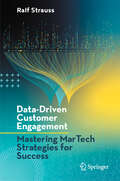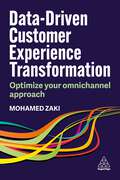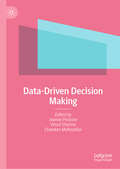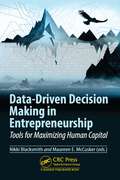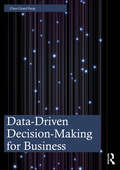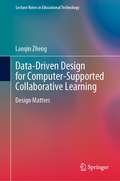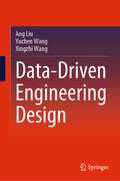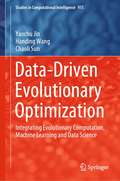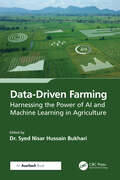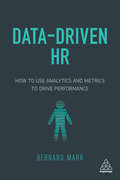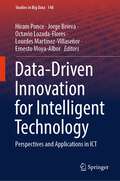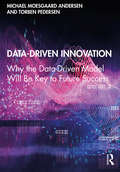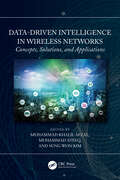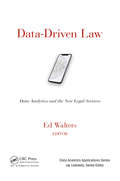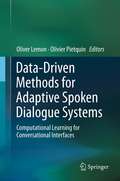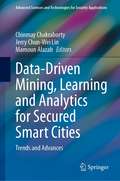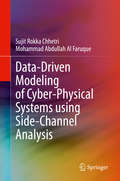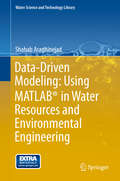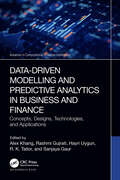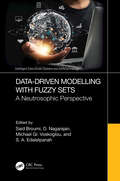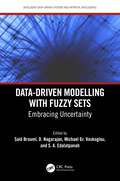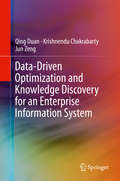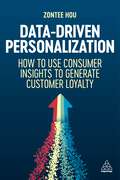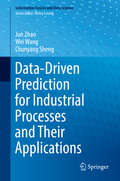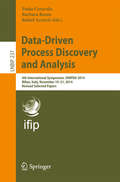- Table View
- List View
Data-Driven Customer Engagement: Mastering MarTech Strategies for Success
by Ralf StraussEmbark on a journey through the rapidly evolving landscape of Marketing Technology (MarTech) with this comprehensive guide. From understanding the strategic imperatives driving MarTech adoption to navigating the intricacies of data-driven customer interaction, this book provides invaluable insights and practical strategies. Explore topics ranging from budget allocation and market potential to data readiness and GDPR compliance, gaining a deep understanding of key concepts and best practices. Whether you're grappling with the complexities of AI integration or seeking to optimize measurement and KPIs, this book equips you with the knowledge and tools needed to thrive in today's digital marketing environment. With decades of industry experience, Ralf Strauss offers in this book a roadmap for success, empowering marketers to navigate the challenges and seize the opportunities presented by MarTech innovation.
Data-Driven Customer Experience Transformation: Optimize Your Omnichannel Approach
by Mohamed ZakiWe are living in an experience-driven economy, where the customer's experience is paramount and even beloved brands risk losing market share due to a single negative customer experience.In our technology-led, omnichannel environment, one of the biggest risks for brands is a lack of consistency in their customer experience across digital, physical and social channels. Data-driven Customer Experience Transformation provides insights and frameworks for creating delightful customer experiences across all three channels, by leveraging data and the latest technologies. Using cutting-edge research from the Cambridge Service Alliance, at the University of Cambridge, this book explores the importance of omnichannel customer-centricity across all sectors and takes you on a journey from setting your strategy, through designing and managing your customer experiences in real-time. It explores how AI can be used to identify opportunities and predict engagement, as well as how to use data to understand customer loyalty, forge stronger customer relationships and drive growth.By combining academic rigour with real-world examples from leading companies such as Microsoft, KFC and Emirates Airline, this book is the ultimate guide to designing and implementing an exceptional data-driven customer experience across all channels, whether you work in B2B, B2C or public services.
Data-Driven Decision Making
by Vinod Sharma Chandan Maheshkar Jeanne PouloseThis book delves into contemporary business analytics techniques across sectors for critical decision-making. It combines data, mathematical and statistical models, and information technology to present alternatives for decision evaluation. Offering systematic mechanisms, it explores business contexts, factors, and relationships to foster competitiveness. Beyond managerial perspectives, it includes contributions from professionals, academics, and scholars worldwide, delivering comprehensive knowledge and skills through diverse viewpoints, cases, and applications of analytical tools. As an international business science reference, it targets professionals, academics, researchers, doctoral scholars, postgraduate students, and research organizations seeking a nuanced understanding of modern business analytics.
Data-Driven Decision Making in Entrepreneurship: Tools for Maximizing Human Capital
by Nikki Blacksmith Maureen E. McCuskerSince the beginning of the 21st century, there has been an explosion in startup organizations. Together, these organizations have been valued at over $3 trillion. In 2019, alone, nearly $300 billion of venture capital was invested globally (Global Startup Ecosystem Report 2020). Simultaneously, an explosion in high volume and high velocity of big data is rapidly changing how organizations function. Gone are the days where organizations can make decisions solely on intuition, logic, or experience. Some have gone as far as to say that data is the most valuable currency and resource available to businesses, and startups are no exception. However, startups and small businesses do differ from their larger counterparts and corporations in three distinct ways: 1) they tend to have fewer resources, time, and specialized training to devote to data analytics; 2) they are part of a unique entrepreneurial ecosystem with unique needs; 3) scholarship and academic research on human capital data analytics in startups is lacking. Existing entrepreneurship research focuses almost exclusively on macro-level aspects. There has been little to no integration of micro- and meso-level research (i.e., individual and team sciences), which is unfortunate given how organizational scientists have significantly advanced human capital data analytics. Unlike other books focused on data analytics and decision for organizations, this proposed book is purposefully designed to be more specifically aimed at addressing the unique idiosyncrasies of the science, research, and practice of startups. Each chapter highlights a specific organizational domain and discuss how a novel data analytic technique can help enhance decision-making, provides a tutorial of said regarding the data analytic technique, and lists references and resources for the respective data analytic technique. The volume will be grounded in sound theory and practice of organizational psychology, entrepreneurship and management and is divided into two parts: assessing and evaluating human capital performance and the use of data analytics to manage human capital.
Data-Driven Decision-Making for Business
by Claus Grand BangResearch shows that companies that employ data-driven decision-making are more productive, have a higher market value, and deliver higher returns for their shareholders. In this book, the reader will discover the history, theory, and practice of data-driven decision-making, learning how organizations and individual managers alike can utilize its methods to avoid cognitive biases and improve confidence in their decisions. It argues that value does not come from data, but from acting on data.Throughout the book, the reader will examine how to convert data to value through data-driven decision-making, as well as how to create a strong foundation for such decision-making within organizations. Covering topics such as strategy, culture, analysis, and ethics, the text uses a collection of diverse and up-to-date case studies to convey insights which can be developed into future action. Simultaneously, the text works to bridge the gap between data specialists and businesspeople. Clear learning outcomes and chapter summaries ensure that key points are highlighted, enabling lecturers to easily align the text to their curriculums.Data-Driven Decision-Making for Business provides important reading for undergraduate and postgraduate students of business and data analytics programs, as well as wider MBA classes. Chapters can also be used on a standalone basis, turning the book into a key reference work for students graduating into practitioners. The book is supported by online resources, including PowerPoint slides for each chapter.
Data-Driven Design for Computer-Supported Collaborative Learning: Design Matters (Lecture Notes in Educational Technology)
by Lanqin ZhengThis book highlights the importance of design in computer-supported collaborative learning (CSCL) by proposing data-driven design and assessment. It addresses data-driven design, which focuses on the processing of data and on improving design quality based on analysis results, in three main sections. The first section explains how to design collaborative learning activities based on data-driven design approaches, while the second shares illustrative examples of computer-supported collaborative learning activities. In turn, the third and last section demonstrates how to evaluate design quality and the fidelity of enactment based on design-centered research.The book features several examples of innovative data-driven design approaches to optimizing collaborative learning activities; highlights innovative CSCL activities in authentic learning environments; demonstrates how learning analytics can be used to optimize CSCL design; and discusses the design-centered research approach to evaluating the alignment between design and enactment in CSCL. Given its scope, it will be of interest to a broad readership including researchers, educators, practitioners, and students in the field of collaborative learning, as well as the rapidly growing community of people who are interested in optimizing learning performance with CSCL.
Data-Driven Engineering Design
by Yuchen Wang Ang Liu Xingzhi WangThis book addresses the emerging paradigm of data-driven engineering design. In the big-data era, data is becoming a strategic asset for global manufacturers. This book shows how the power of data can be leveraged to drive the engineering design process, in particular, the early-stage design.Based on novel combinations of standing design methodology and the emerging data science, the book presents a collection of theoretically sound and practically viable design frameworks, which are intended to address a variety of critical design activities including conceptual design, complexity management, smart customization, smart product design, product service integration, and so forth. In addition, it includes a number of detailed case studies to showcase the application of data-driven engineering design. The book concludes with a set of promising research questions that warrant further investigation.Given its scope, the book will appeal to a broad readership, including postgraduate students, researchers, lecturers, and practitioners in the field of engineering design.
Data-Driven Evolutionary Optimization: Integrating Evolutionary Computation, Machine Learning and Data Science (Studies in Computational Intelligence #975)
by Yaochu Jin Handing Wang Chaoli SunIntended for researchers and practitioners alike, this book covers carefully selected yet broad topics in optimization, machine learning, and metaheuristics. Written by world-leading academic researchers who are extremely experienced in industrial applications, this self-contained book is the first of its kind that provides comprehensive background knowledge, particularly practical guidelines, and state-of-the-art techniques. New algorithms are carefully explained, further elaborated with pseudocode or flowcharts, and full working source code is made freely available. This is followed by a presentation of a variety of data-driven single- and multi-objective optimization algorithms that seamlessly integrate modern machine learning such as deep learning and transfer learning with evolutionary and swarm optimization algorithms. Applications of data-driven optimization ranging from aerodynamic design, optimization of industrial processes, to deep neural architecture search are included.
Data-Driven Farming: Harnessing the Power of AI and Machine Learning in Agriculture
by Syed Nisar Hussain BukhariIn the dynamic realm of agriculture, artificial intelligence (AI) and machine learning (ML) emerge as catalysts for unprecedented transformation and growth. The emergence of big data, Internet of Things (IoT) sensors, and advanced analytics has opened up new possibilities for farmers to collect and analyze data in real-time, make informed decisions, and increase efficiency. AI and ML are key enablers of data-driven farming, allowing farmers to use algorithms and predictive models to gain insights into crop health, soil quality, weather patterns, and more. Agriculture is an industry that is deeply rooted in tradition, but the landscape is rapidly changing with the emergence of new technologies.Data-Driven Farming: Harnessing the Power of AI and Machine Learning in Agriculture is a comprehensive guide that explores how the latest advances in technology can help farmers make better decisions and maximize yields. It offers a detailed overview of the intersection of data, AI, and ML in agriculture and offers real-world examples and case studies that demonstrate how these tools can help farmers improve efficiency, reduce waste, and increase profitability. Exploring how AI and ML can be used to achieve sustainable and profitable farming practices, the book provides an introduction to the basics of data-driven farming, including an overview of the key concepts, tools, and technologies. It also discusses the challenges and opportunities facing farmers in today’s data-driven landscape. Covering such topics as crop monitoring, weather forecasting, pest management, and soil health management, the book focuses on analyzing data, predicting outcomes, and optimizing decision-making in a range of agricultural contexts.
Data-Driven HR: How to Use Analytics and Metrics to Drive Performance
by Bernard MarrTraditionally seen as a purely people function unconcerned with numbers, HR is now uniquely placed to use company data to drive performance, both of the people in the organization and the organization as a whole. Data-Driven HR is a practical guide which enables HR professionals to leverage the value of the vast amount of data available at their fingertips. Covering how to identify the most useful sources of data, collect information in a transparent way that is in line with data protection requirements and turn this data into tangible insights, this book marks a turning point for the HR profession. Covering all the key elements of HR including recruitment, employee engagement, performance management, wellbeing and training, Data-Driven HR examines the ways data can contribute to organizational success by, among other things, optimizing processes, driving performance and improving HR decision making. Packed with case studies and real-life examples, this is essential reading for all HR professionals looking to make a measurable difference in their organizations.
Data-Driven Innovation for Intelligent Technology: Perspectives and Applications in ICT (Studies in Big Data #148)
by Jorge Brieva Lourdes Martínez-Villaseñor Hiram Ponce Ernesto Moya-Albor Octavio Lozada-FloresThis book focuses on new perspectives and applications of data-driven innovation technologies, applied artificial intelligence, applied machine learning and deep learning, data science, and topics related to transforming data into value.It includes theory and use cases to help readers understand the basics of data-driven innovation and to highlight the applicability of the technologies. It emphasizes how the data lifecycle is applied in current technologies in different business domains and industries, such as advanced materials, healthcare and medicine, resource optimization, control and automation, among others.This book is useful for anyone interested in data-driven innovation for smart technologies, as well as those curious in implementing cutting-edge technologies to solve impactful artificial intelligence, data science, and related information technology and communication problems.
Data-Driven Innovation: Why the Data-Driven Model Will Be Key to Future Success
by Torben Pedersen Michael Moesgaard AndersenToday, innovation does not just occur in large and incumbent R&D organizations. Instead, it often emerges from the start-up community. In the new innovation economy, the key is to quickly find pieces of innovation, some of which may already be developed. Therefore, there is the need for more advanced means of searching and identifying innovation wherever it may occurs. We point to the importance of data-driven innovation based on digital platforms, as their footprints are growing rapidly and in sync with the shift from analogue to digital innovation workflows. This book offers companies insights on paths to business success and tools that will help them find the right route through the various options when it comes to the digital platforms where innovations may be discovered and from which value may be appropriated. The world hungers for growth and one of the most important vehicles for growth is innovation. In light of the new digital platforms from which data-driven innovation can be extracted, major parts of analogue workflows will be substituted with digital workflows. Data-driven innovation and digital innovation workflows are here to stay. Are you?
Data-Driven Intelligence in Wireless Networks: Concepts, Solutions, and Applications
by Sung Won Kim Muhammad Khalil Afzal Muhammad AteeqThis book highlights the importance of data-driven techniques to solve wireless communication problems. It presents a number of problems (e.g., related to performance, security, and social networking), and provides solutions using various data-driven techniques, including machine learning, deep learning, federated learning, and artificial intelligence.This book details wireless communication problems that can be solved by data-driven solutions. It presents a generalized approach toward solving problems using specific data-driven techniques. The book also develops a taxonomy of problems according to the type of solution presented and includes several case studies that examine data-driven solutions for issues such as quality of service (QoS) in heterogeneous wireless networks, 5G/6G networks, and security in wireless networks. The target audience of this book includes professionals, researchers, professors, and students working in the field of networking, communications, machine learning, and related fields.
Data-Driven Law: Data Analytics and the New Legal Services (Data Analytics Applications)
by Edward J. WaltersFor increasingly data-savvy clients, lawyers can no longer give "it depends" answers rooted in anecdata. Clients insist that their lawyers justify their reasoning, and with more than a limited set of war stories. The considered judgment of an experienced lawyer is unquestionably valuable. However, on balance, clients would rather have the considered judgment of an experienced lawyer informed by the most relevant information required to answer their questions. Data-Driven Law: Data Analytics and the New Legal Services helps legal professionals meet the challenges posed by a data-driven approach to delivering legal services. Its chapters are written by leading experts who cover such topics as: Mining legal data Computational law Uncovering bias through the use of Big Data Quantifying the quality of legal services Data mining and decision-making Contract analytics and contract standards In addition to providing clients with data-based insight, legal firms can track a matter with data from beginning to end, from the marketing spend through to the type of matter, hours spent, billed, and collected, including metrics on profitability and success. Firms can organize and collect documents after a matter and even automate them for reuse. Data on marketing related to a matter can be an amazing source of insight about which practice areas are most profitable. Data-driven decision-making requires firms to think differently about their workflow. Most firms warehouse their files, never to be seen again after the matter closes. Running a data-driven firm requires lawyers and their teams to treat information about the work as part of the service, and to collect, standardize, and analyze matter data from cradle to grave. More than anything, using data in a law practice requires a different mindset about the value of this information. This book helps legal professionals to develop this data-driven mindset.
Data-Driven Methods for Adaptive Spoken Dialogue Systems: Computational Learning for Conversational Interfaces
by Oliver Lemon Olivier PietquinData driven methods have long been used in Automatic Speech Recognition (ASR) and Text-To-Speech (TTS) synthesis and have more recently been introduced for dialogue management, spoken language understanding, and Natural Language Generation. Machine learning is now present "end-to-end" in Spoken Dialogue Systems (SDS). However, these techniques require data collection and annotation campaigns, which can be time-consuming and expensive, as well as dataset expansion by simulation. In this book, we provide an overview of the current state of the field and of recent advances, with a specific focus on adaptivity.
Data-Driven Mining, Learning and Analytics for Secured Smart Cities: Trends and Advances (Advanced Sciences and Technologies for Security Applications)
by Jerry Chun-Wei Lin Mamoun Alazab Chinmay ChakrabortyThis book provides information on data-driven infrastructure design, analytical approaches, and technological solutions with case studies for smart cities. This book aims to attract works on multidisciplinary research spanning across the computer science and engineering, environmental studies, services, urban planning and development, social sciences and industrial engineering on technologies, case studies, novel approaches, and visionary ideas related to data-driven innovative solutions and big data-powered applications to cope with the real world challenges for building smart cities.
Data-Driven Modeling of Cyber-Physical Systems using Side-Channel Analysis
by Mohammad Abdullah Al Faruque Sujit Rokka ChhetriThis book provides a new perspective on modeling cyber-physical systems (CPS), using a data-driven approach. The authors cover the use of state-of-the-art machine learning and artificial intelligence algorithms for modeling various aspect of the CPS. This book provides insight on how a data-driven modeling approach can be utilized to take advantage of the relation between the cyber and the physical domain of the CPS to aid the first-principle approach in capturing the stochastic phenomena affecting the CPS. The authors provide practical use cases of the data-driven modeling approach for securing the CPS, presenting novel attack models, building and maintaining the digital twin of the physical system. The book also presents novel, data-driven algorithms to handle non- Euclidean data. In summary, this book presents a novel perspective for modeling the CPS.
Data-Driven Modeling: Using MATLAB® in Water Resources and Environmental Engineering (Water Science and Technology Library #67)
by Shahab Araghinejad"Data-Driven Modeling: Using MATLAB® in Water Resources and Environmental Engineering" provides a systematic account of major concepts and methodologies for data-driven models and presents a unified framework that makes the subject more accessible to and applicable for researchers and practitioners. It integrates important theories and applications of data-driven models and uses them to deal with a wide range of problems in the field of water resources and environmental engineering such as hydrological forecasting, flood analysis, water quality monitoring, regionalizing climatic data, and general function approximation. The book presents the statistical-based models including basic statistical analysis, nonparametric and logistic regression methods, time series analysis and modeling, and support vector machines. It also deals with the analysis and modeling based on artificial intelligence techniques including static and dynamic neural networks, statistical neural networks, fuzzy inference systems, and fuzzy regression. The book also discusses hybrid models as well as multi-model data fusion to wrap up the covered models and techniques. The source files of relatively simple and advanced programs demonstrating how to use the models are presented together with practical advice on how to best apply them. The programs, which have been developed using the MATLAB® unified platform, can be found on extras. springer. com. The main audience of this book includes graduate students in water resources engineering, environmental engineering, agricultural engineering, and natural resources engineering. This book may be adapted for use as a senior undergraduate and graduate textbook by focusing on selected topics. Alternatively, it may also be used as a valuable resource book for practicing engineers, consulting engineers, scientists and others involved in water resources and environmental engineering.
Data-Driven Modelling and Predictive Analytics in Business and Finance: Concepts, Designs, Technologies, and Applications (Advances in Computational Collective Intelligence)
by Alex Khang Rashmi Gujrati Hayri Uygun R. K. Tailor Sanjaya Singh GaurData-driven and AI-aided applications are next-generation technologies that can be used to visualize and realize intelligent transactions in finance, banking, and business. These transactions will be enabled by powerful data-driven solutions, IoT technologies, AI-aided techniques, data analytics, and visualization tools. To implement these solutions, frameworks will be needed to support human control of intelligent computing and modern business systems. The power and consistency of data-driven competencies are a critical challenge, and so is developing explainable AI (XAI) to make data-driven transactions transparent.Data- Driven Modelling and Predictive Analytics in Business and Finance covers the need for intelligent business solutions and applications. Explaining how business applications use algorithms and models to bring out the desired results, the book covers: Data-driven modelling Predictive analytics Data analytics and visualization tools AI-aided applications Cybersecurity techniques Cloud computing IoT-enabled systems for developing smart financial systems This book was written for business analysts, financial analysts, scholars, researchers, academics, professionals, and students so they may be able to share and contribute new ideas, methodologies, technologies, approaches, models, frameworks, theories, and practices.
Data-Driven Modelling with Fuzzy Sets: A Neutrosophic Perspective (Intelligent Data-Driven Systems and Artificial Intelligence)
by Said Broumi D. Nagarajan Michael Gr. Voskoglou S. A. EdalatpanahFuzzy sets have long been employed to handle imprecise and uncertain information in the real world, but their limitations in dealing with incomplete and inconsistent data led to the emergence of neutrosophic sets. In this thought-provoking book, titled Data-Driven Modelling with Fuzzy Sets: A Neutrosophic Perspective, the authors delve into the theories and extensive applications of neutrosophic sets, ranging from neutrosophic graphs to single-valued trapezoidal neutrosophic sets and their practical implications in knowledge management, including student learning assessment, academic performance evaluation, and technical article screening. This comprehensive resource is intended to benefit mathematicians, physicists, computer experts, engineers, scholars, practitioners, and students seeking to deepen their understanding of neutrosophic sets and their practical applications in diverse fields. This book comprises 11 chapters that provide a thorough examination of neutrosophic set theory and its extensions. Each chapter presents valuable insights into various aspects of data-driven modeling with neutrosophic sets and explores their applications in different domains. The book covers a wide range of topics. The specific topics covered in the book include neutrosophic submodules, applications of neutrosophic sets, solutions to differential equations with neutrosophic uncertainty, cardinalities of neutrosophic sets, neutrosophic cylindrical coordinates, applications to graphs and climatic analysis, neutrosophic differential equation approaches to growth models, neutrosophic aggregation operators for decision making, and similarity measures for Fermatean neutrosophic sets. The diverse contributions from experts in the field, coupled with the constructive feedback from reviewers, ensure the book's high quality and relevance.This book presents a qualitative assessment of big data in the education sector using linguistic quadripartitioned single-valued neutrosophic soft sets showcases application of n-cylindrical fuzzy neutrosophic sets in education using neutrosophic affinity degree and neutrosophic similarity index covers scientific evaluation of student academic performance using single-valued neutrosophic Markov chain illustrates multi-granulation single-valued neutrosophic probabilistic rough sets for teamwork assessment examines estimation of distribution algorithms based on multiple-attribute group decision-making to evaluate teaching quality With its wealth of knowledge, this book aims to inspire further research and innovation in the field of neutrosophic sets and their extensions, providing a valuable resource for scholars, practitioners, and students alike.
Data-Driven Modelling with Fuzzy Sets: Embracing Uncertainty (Intelligent Data-Driven Systems and Artificial Intelligence)
by Said Broumi D. Nagarajan Michael Gr. Voskoglou S. A. EdalatpanahZadeh introduced in 1965 the theory of fuzzy sets, in which truth values are modelled by numbers in the unit interval [0, 1], for tackling mathematically the frequently appearing in everyday life partial truths. In a second stage, when membership functions were reinterpreted as possibility distributions, fuzzy sets were extensively used to embrace uncertainty modelling. Uncertainty is defined as the shortage of precise knowledge or complete information and possibility theory is devoted to the handling of incomplete information. Zadeh articulated the relationship between possibility and probability, noticing that what is probable must preliminarily be possible. Following the Zadeh’s fuzzy set, various generalizations (intuitionistic, neutrosophic, rough, soft sets, etc.) have been introduced enabling a more effective management of all types of the existing in real world uncertainty. This book presents recent theoretical advances and applications of fuzzy sets and their extensions to Science, Humanities and Education.This book: Presents a qualitative assessment of big data in the education sector using linguistic Quadri partitioned single valued neutrosophic soft sets. Showcases application of n-cylindrical fuzzy neutrosophic sets in education using neutrosophic affinity degree and neutrosophic similarity Index. Covers scientific evaluation of student academic performance using single value neutrosophic Markov chain. Illustrates multi-granulation single-valued neutrosophic probabilistic rough sets for teamwork assessment. Examines estimation of distribution algorithm based on multiple attribute group decision-making to evaluate teaching quality. It is primarily written for Senior undergraduate and graduate students and academic researchers in the fields of electrical engineering, electronics and communication engineering, computer science and engineering.
Data-Driven Optimization and Knowledge Discovery for an Enterprise Information System
by Krishnendu Chakrabarty Qing Duan Jun ZengThis book provides a comprehensive set of optimization and prediction techniques for an enterprise information system. Readers with a background in operations research, system engineering, statistics, or data analytics can use this book as a reference to derive insight from data and use this knowledge as guidance for production management. The authors identify the key challenges in enterprise information management and present results that have emerged from leading-edge research in this domain. Coverage includes topics ranging from task scheduling and resource allocation, to workflow optimization, process time and status prediction, order admission policies optimization, and enterprise service-level performance analysis and prediction. With its emphasis on the above topics, this book provides an in-depth look at enterprise information management solutions that are needed for greater automation and reconfigurability-based fault tolerance, as well as to obtain data-driven recommendations for effective decision-making.
Data-Driven Personalization: How to Use Consumer Insights to Generate Customer Loyalty
by Zontee HouMake your marketing truly resonate by personalizing every message, powered by data, research and behavioral economics. To break through the noise, marketers today need to be hyper-relevant to their customers. To do that takes data and a deep understanding of your audience. Data-Driven Personalization breaks down the best ways to reach new customers and better engage your best customers. By combining principles of persuasion, behavioral economics and industry research, this book provides readers with an actionable blueprint for how to implement a customer-centric approach to marketing that will drive results. The book is broken into six parts that detail everything from what data is most valuable for personalization to how to build a data-driven marketing team that's prepared for the next five years and beyond. Each chapter includes actionable insights to guide marketers as they implement a data-driven personalization approach to their strategy. The chapters also focus on hands-on tactics like identifying messages that will move the needle with customers, how to generate seamless omnichannel experiences and how to balance personalization with data privacy. The book features case studies from top brands, including FreshDirect, Target, Adobe, Cisco and Spotify.
Data-Driven Prediction for Industrial Processes and Their Applications (Information Fusion and Data Science)
by Wei Wang Jun Zhao Chunyang ShengThis book presents modeling methods and algorithms for data-driven prediction and forecasting of practical industrial process by employing machine learning and statistics methodologies. Related case studies, especially on energy systems in the steel industry are also addressed and analyzed. The case studies in this volume are entirely rooted in both classical data-driven prediction problems and industrial practice requirements. Detailed figures and tables demonstrate the effectiveness and generalization of the methods addressed, and the classifications of the addressed prediction problems come from practical industrial demands, rather than from academic categories. As such, readers will learn the corresponding approaches for resolving their industrial technical problems. Although the contents of this book and its case studies come from the steel industry, these techniques can be also used for other process industries. This book appeals to students, researchers, and professionals within the machine learning and data analysis and mining communities.
Data-Driven Process Discovery and Analysis: 4th International Symposium, SIMPDA 2014, Milan, Italy, November 19-21, 2014, Revised Selected Papers (Lecture Notes in Business Information Processing #237)
by Barbara Russo Paolo Ceravolo Rafael AccorsiThis book constitutes the thoroughlyrefereed proceedings of the Fourth InternationalSymposium on Data-Driven Process Discovery and Analysis held in Riva del Milan,Italy, in November 2014. The five revised full papers were carefully selected from21 submissions. Following the event, authors weregiven the opportunity to improve their papers with the insights they gainedfrom the symposium. During this edition, the presentations and discussionsfrequently focused on the implementation of process mining algorithms incontexts where the analytical process is fed by data streams. The selectedpapers underline the most relevant challenges identified and propose novelsolutions and approaches for their solution.
